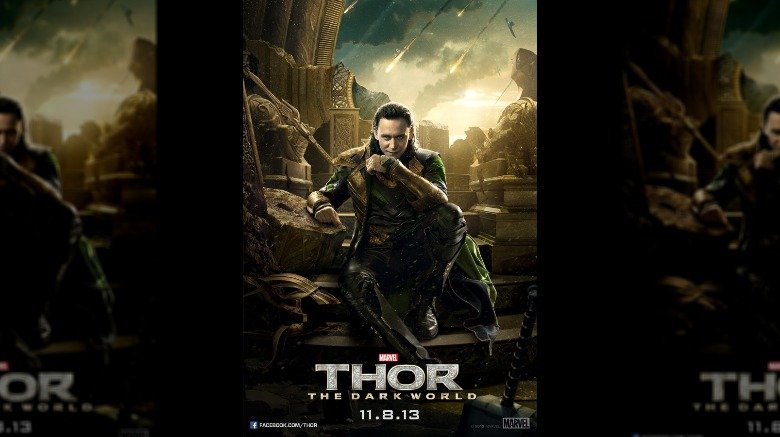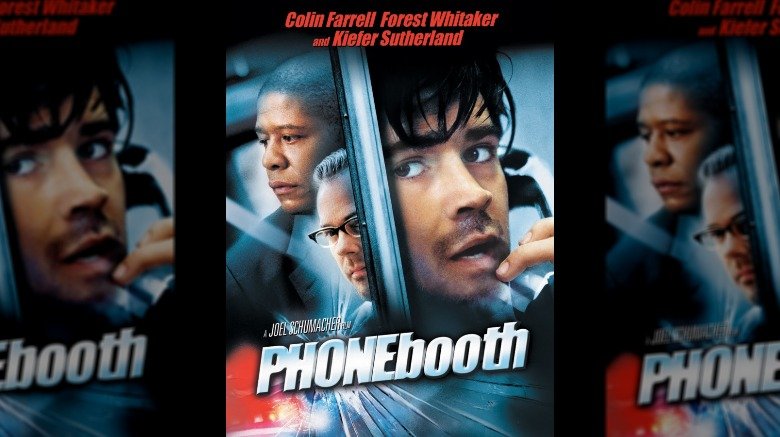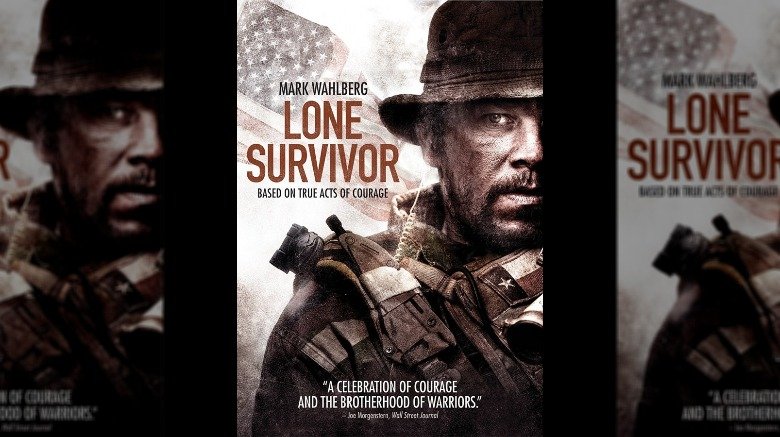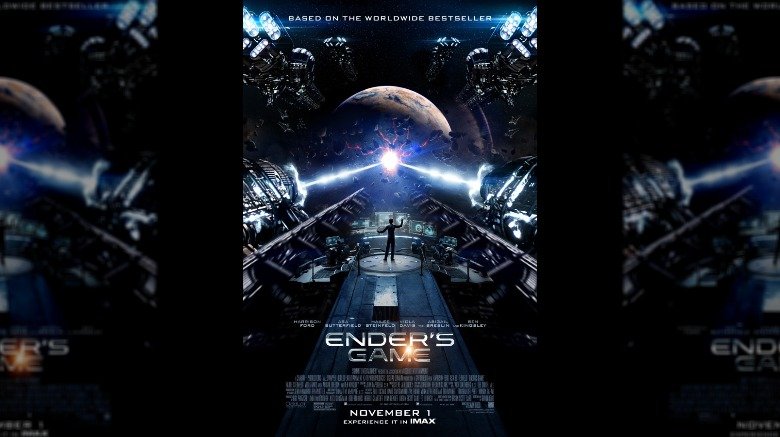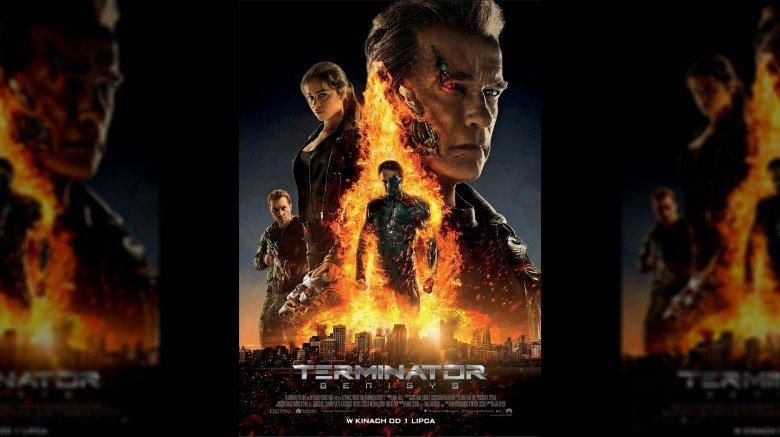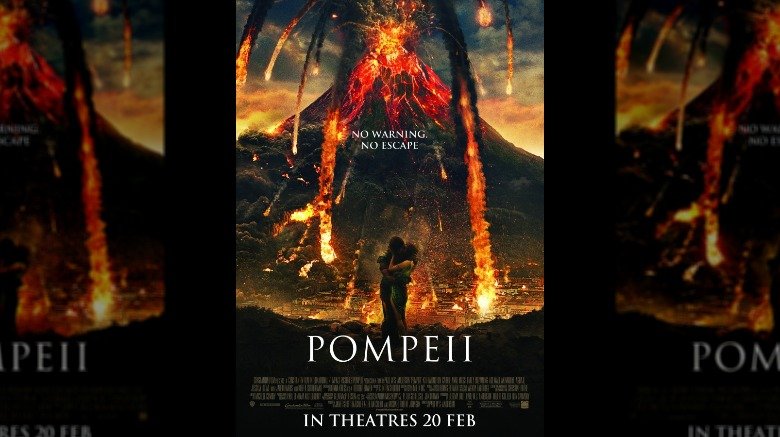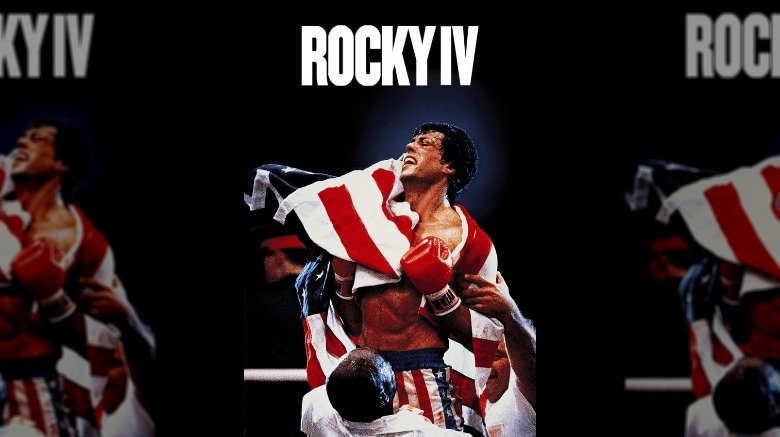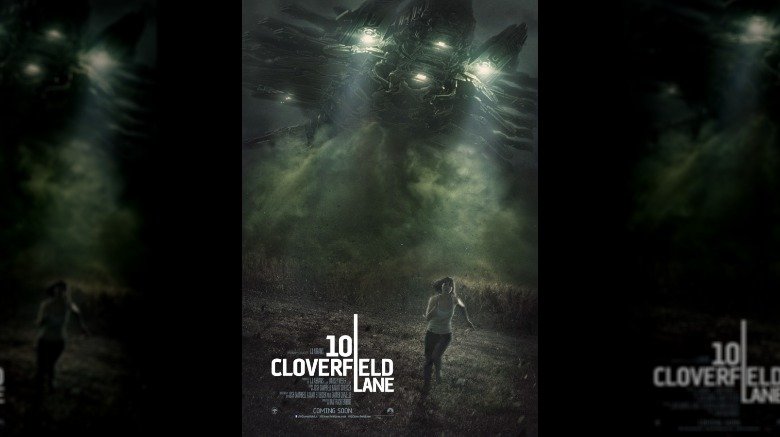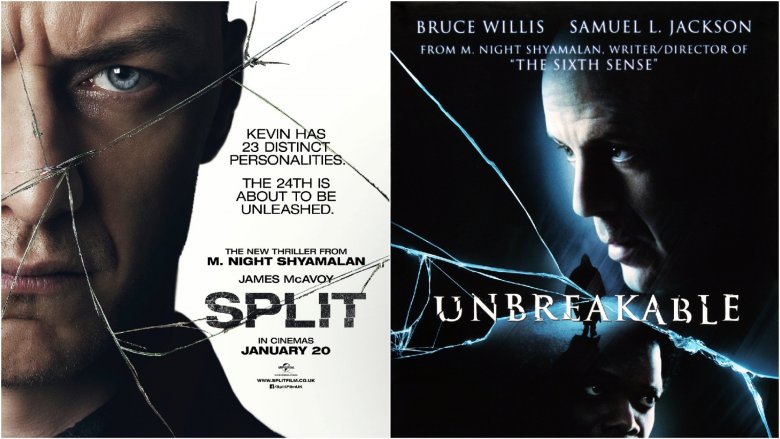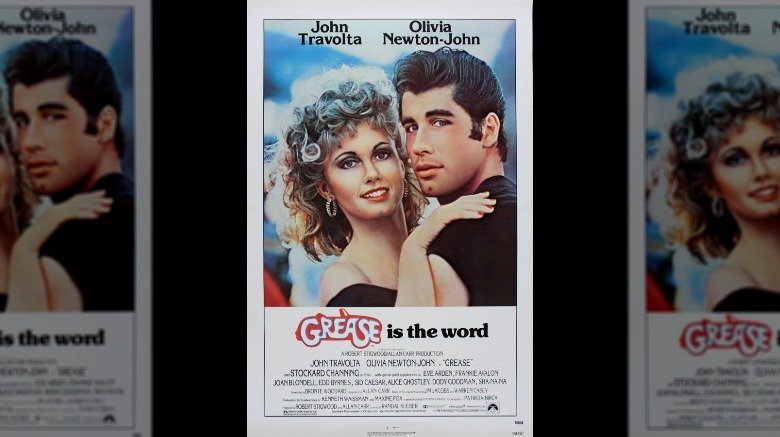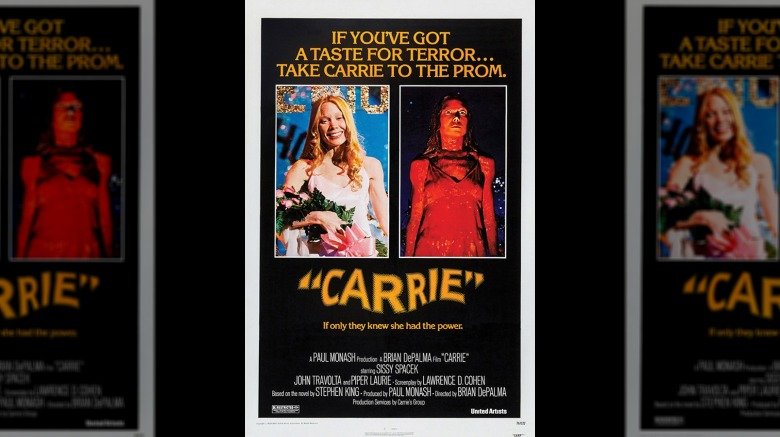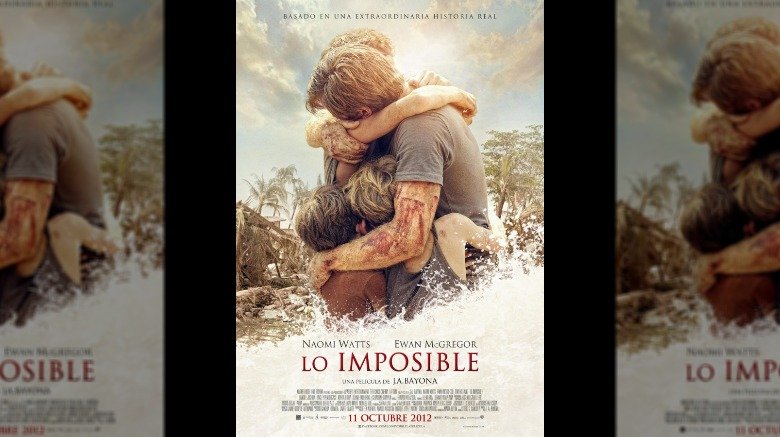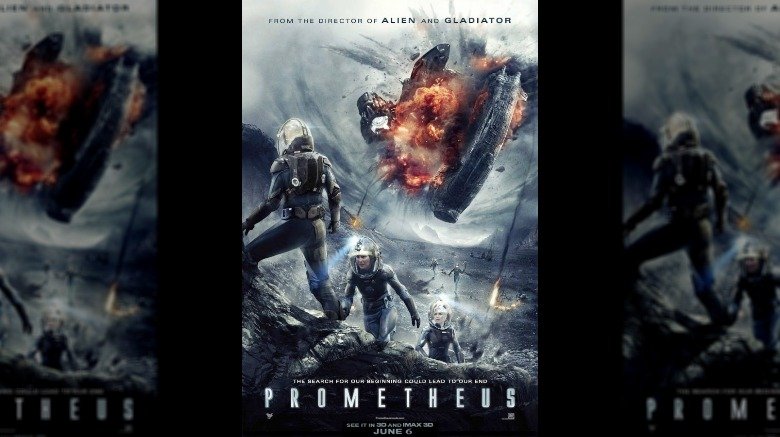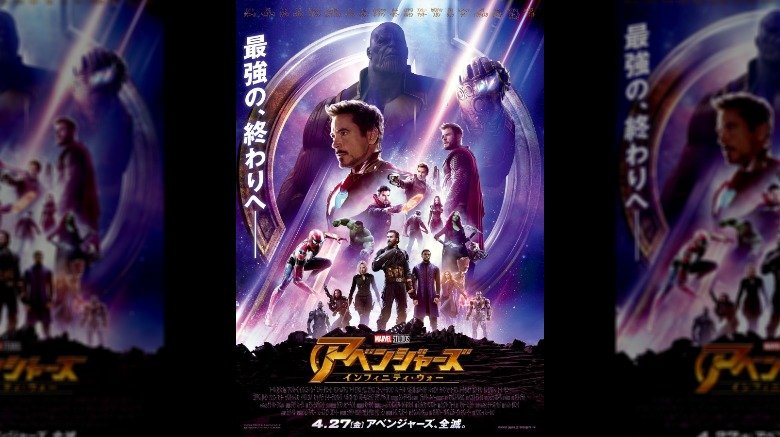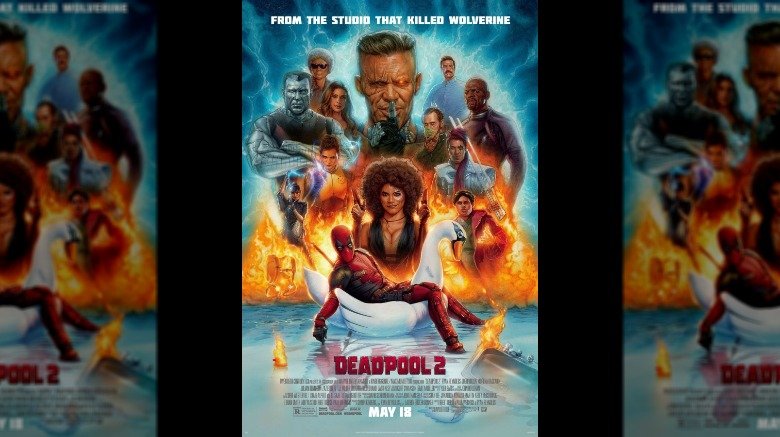Posters That Spoiled The Entire Movie
As aggravating as it can be when a trailer spoils a movie, it's almost worse when a poster does it. At least trailers have the excuse of including glimpses of multiple scenes — if one major spoiler slips through the cracks in the midst of all that action, it's a little easier to understand. Posters, however, don't have that excuse. Their designers only have one job: to create a single compelling picture that gets audiences excited to see a film. You'd think very few posters would need to rely on a spoiler-filled image to entice potential ticket buyers. After all, given the infinite artistic possibilities presented by your average movie's story, there's no need to resort to imagery that could spoil secrets or give away the plot, right?
Well, maybe not. Unfortunately for the poor souls excited to see the following films, the teams responsible for creating their posters couldn't figure out how to lure people into theaters without spoiling the movie in the process. Get ready to see some of the most ill-advised marketing material in Hollywood history — these are posters that spoiled the entire movie.
Loki tricks Marvel's marketing team
They're admittedly subtle, but any keen-eyed Marvel fan can piece together the hard-hitting spoilers this poster is laying down. Just take a peek at Loki's feet. Keeping the God of Mischief's boots company are not one, but two Asgardian artifacts: Thor's hammer and Odin's helmet. This imagery insinuates that, in the course of the movie, Loki will somehow outlast both his father and brother. While that ends up being true in The Dark World, the poster is actually even more insidiously spoilerific than it might seem.
There's no way Thor wasn't going to survive this movie, which means his hammer at Loki's feet is symbolic. Odin's helmet, meanwhile, might be far less symbolic — he's more powerful than Thor or Loki, but in the MCU, the character has had a relative lack of narrative importance. Combine all this information, and it's clear that the poster is revealing that not only does Loki survive the events of the movie, but he dupes Thor in some capacity and does the same, if not worse, to Odin. Digging even deeper, the sinister implications regarding the fate of Asgard's throne are clear. This poster did a stellar job of giving away absolutely everything about Thor: The Dark World, though only the sharpest of Marvel fans likely picked up on its visual clues before the film's release.
Bring some extra quarters
Phone Booth is the story of a man (Colin Farrell) who stands inside a phone booth for the better part of a day. Surprising as it may be, that premise leads to a pretty interesting story. The narrative's intrigue comes from the fact that Farrell's not just standing in the booth of his own volition: he's a hostage, who's being told to stay inside — or else — by a voice on the other end of the line. That's the movie's central mystery: who's the caller? It's a gripping question, especially when coupled with the fact that this mysterious antagonist is somewhere within seeing distance, as it's later revealed he has a sniper aimed at Farrell.
With all this hype surrounding the mysterious caller, it'd be pretty silly if the promotional material revealed his identity, and yet that's exactly what happened: Smack-dab in the designated villains-only corner of Phone Booth's poster is the baleful mug of Kiefer Sutherland, who menacingly pokes his head out from behind the booth just in case there was any doubt about his role in the film.
Military-grade spoilers
Based on a true story, Lone Survivor tells the harrowing tale of, well, the lone guy on the poster. Get the idea? Beyond milking the star power of the leading man, there's really no reason for this design to spoil its movie's conclusion by foisting a singular image of Mark Wahlberg on us.
Though its poster would have you believe otherwise, Lone Survivor is actually about a four-man Navy SEAL team tasked with hunting down a terrorist leader who's nestled himself away within the Hindu Kush region of Afghanistan. One of the four men is Mark Wahlberg, who plays real-life SEAL — and the true story's lone survivor — Marcus Luttrell. Given that the movie is based on the book of the same name, it's true that anyone who keeps up with war news or autobiographical nonfiction would know the outcome before going in, but for the general populace, the poster unnecessarily summarizes the book and real-life story all within a single image. Wahlberg/Luttrell survives! Thanks, marketing, for saving us two hours.
His name is Ender for a reason
Ender's Game's advertising offers a classic case of final-frame syndrome: when a poster spoils its movie's finale by showing the climax's most important shot. Coupled with even a basic synopsis of the film, this poster gives it all away. Don't take our word for it, just give this bit-sized logline a read: "Ender's Game is the story of a kid who must train to preemptively prevent an alien invasion." Couple that short sentence with the poster's image of Ender blowing up a planet with a giant pair of mega-lasers, and given these two pieces of info, there really aren't a lot of questions left on the table. Does he prevent the alien invasion? Well, clearly, if he's shown blowing up their planet on the dang poster. And even if one doesn't immediately connect the dots before starting the film, the poster's true nature will eventually reveal itself and still guarantee that the ending is spoiled way ahead of time.
Worse yet, beyond spoiling the movie for the general public, the poster also ensures that people who've read the book get spoiled by knowing that the movie will end, by and large, the same way as its source material. All around, it's not a very smart poster — an ironic failure, given that the movie it's advertising is actually pretty intelligent.
Skynet defeats humanity with promo art
While Terminator Genisys' second trailer gave away this big spoiler as well, the reality is that trailers are far easier to avoid (or close your eyes during) than a poster, which reveals its contents the second you see it. In this case, Terminator Genisys' poster chose to reveal that its "hero," John Connor, is actually a Terminator and, by extension, the villain — a twist that doesn't creep up until halfway through the movie. Worse yet, this is the movie's only real twist. It isn't like the marketing team had anything else up their sleeves when they revealed this bombshell; no, this is the movie's sole hook — leading some to speculate that the poster was just a desperate attempt to garner excitement for the film even at the risk of cannibalizing its only thread of intrigue. That desperation theory was all but verified once people saw the movie, realizing why the marketers had spoiled the movie in advance: it was all just a ploy to get a few more butts in theater seats before bad word of mouth started circulating.
That's Pompeii for you
This poster's fatal flaw comes down to its caption, which overtly spells out its accompanying image's visual implications. "No warning. No escape," the tagline dramatically states, its words hovering between the images of an erupting volcano and the film's main love interest engaging in a passionate final kiss. Whatever could these pictures and words be hinting at, we wonder?
To save you the trouble of watching this lackluster movie in order to find out for yourself, yes, in case you were curious, that caption and image spoil the finale of the film. The two lovebirds suffer death by volcano, right after enjoying the few sweet seconds granted by their final kiss. Frankly speaking, especially when coupled with the film's title, the poster couldn't have been a more transparent spoiler if it tried. Though maybe that was the point? Given how bad the movie was, maybe the poster team was trying to steer moviegoers clear of seeing the final product. How meta!
He could have been a contender
Rocky IV allegorically speaks to Cold War tensions between the United States and the Soviet Union. Rocky Balboa, an honorable patriot, represents the U.S., while the unfeeling Ivan Drago represents the Russians. It's about as clear-cut as a movie can get, in terms of setting up an obvious good guy and bad guy. Given that dynamic, no one should have any questions about who, in a Rocky movie, is going to win the big fight at the end. However, in case there was any lingering doubt in a prospective viewer's mind, the movie's poster cleared that confusion right up. Featuring the title character cheering, bruised, and draped in an American flag, the poster challenges you to guess the outcome. Spoiler alert: the Russians don't win. While Rocky movies have always been more about the journey than the destination, Rocky IV's promo poster takes things a little too far in terms of assuming that audiences don't care about discovering the film's outcome for themselves.
So that's what's outside the bunker
By and large, 10 Cloverfield Lane's marketing was very, very carefully crafted, in order to maintain the movie's sense of mystery. Throughout all the trailers and most of the posters, audiences were left to wonder why John Goodman was so intent on keeping Mary Elizabeth Winstead trapped in his bunker. Could it be because Goodman's character was insane? Did it have something to do with the Cloverfield monster from the last movie with "Cloverfield" in the title? No one knew — at least until an international poster came out and blatantly spoiled the big finale. It depicts an alien spacecraft, with Winstead booking it away from the ship in a run for her life. If you guessed that was what Goodman's character was trying to hide out from in the bunker, well, you're right. This poster spoiled the massive twist at the end of the movie — as well as the rest of the story leading up to that point — all with a single image.
An unbreakable split
M. Night Shyamalan's comic book-inspired Unbreakable is about a Philadelphia man named David Dunn (Bruce Willis) who comes to realize that he's nearly invincible, while crossing paths with his villainous opposite, the fragile-boned Elijah Price, a.k.a. Mr. Glass (Samuel L. Jackson). When Unbreakable was released in 2000, Willis told the media that the film was part of a planned trilogy. A sequel never materialized...until it did when nobody was looking.
In 2017, Shyamalan had his biggest hit in years with the psychological thriller Split, starring James McAvoy as a disturbed man with 24 separate personalities who kidnaps a trio of teenage girls. At the end, he escapes, and viewers learn more details about the man on the loose via a news report playing on a TV in a diner. A customer notes the similarities between this suspect and another one from 15 years prior or so. She can't remember his name, until another patron — David Dunn — reminds her: "Mr. Glass."
Split was set in the same universe as Unbreakable all along. Who knew? People who remembered the Unbreakable poster and took a good long look at the one for Split. Both share a virtually identical breaking glass pattern evocative of Mr. Glass and a "split."
Hopelessly devoted to spoilers
Since its release in 1978, Grease has become one of the most popular movies of all time. And why not? Set in a bright-eyed 1959, it boasts killer musical numbers like "Summer Nights" and "You're the One That I Want" and star-making turns from Olivia Newton-John (Sandy) and John Travolta (Danny), two opposites who finally get around to falling in love despite the many obstacles that keep them apart. But that happy ending doesn't come without an O. Henry-style twist: Danny takes up track to impress the prim and proper Sandy, and Sandy shows up at the end-of-school carnival dressed head to toe in tight leather and stilettos, hoping to please greaser Danny. This big reveal — that Sandy has ditched her good girl image and conservative clothes to be "fast" like her frenemy Rizzo (Stockard Channing) — is the eye-popping climax of Grease. Of course, observant audiences saw it coming all along: it's in that guise that Newton-John is depicted on the Grease poster.
If you've got a taste for spoilers...
Based on a Stephen King novel, the 1976 teen horror classic Carrie is about a teenage girl (Sissy Spacek) kept sheltered away from the world by her domineering and deeply troubled mother. Why? Well, Carrie can do powerful things with her telekinetic mind. Socially awkward and full of fear and insecurity, she's bullied by the other kids at school, and it all comes to a head at the prom. Mean girl Norma (P.J. Soles) gets Carrie elected prom queen as a joke. Carrie thinks she's finally won over her horrible high school classmates...until they soak her with a bucket of pig's blood. (Kids!) That sets off Carrie, who, believing everyone in the gym is laughing at her (as her mother warned her they would) uses the full extent of her mental powers to kill pretty much everyone present. It's the climax of the film, and it's revealed on the poster — happy, prom queen Carrie juxtaposed next to angry, blood-drenched Carrie.
It was pretty possible, actually
The Impossible is one of the scariest non-horror movies ever made. The 2012 disaster drama — which is based on a true story — concerns the Bennett family (whose members are portrayed by, among others, Naomi Watts, Ewan McGregor, and Tom Holland) who travel to Thailand to celebrate the 2004 Christmas holiday...until a Boxing Day earthquake — and subsequent tsunami — strikes, turning their vacation into an unspeakable nightmare. More than 250,000 people in 14 countries died as a result of those natural disasters, and The Impossible tells the unflinching, hard-to-watch story of how the Bennetts became separated, survived, and feared the worst about each other's fates. Amazingly, our main characters do eventually reunite in some very cathartic cinematic moments, but it wasn't a surprise to everyone: it's all right there on the very spoilery poster for Lo Imposible, as The Impossible was known in some Spanish-speaking markets.
A shot too cool to save for the movie
There's a lot that about Prometheus that audiences might find confusing, and that's beyond Michael Fassbender's unnerving portrayal of an android named David. Characters' motivations are murky, the setting is sometimes obscure, and the whole thing is supposed to be a prequel to director Ridley Scott's Alien. There are plenty of quiet, pensive, and thoughtful moments, which are not common in a modern-day science-fiction movie, but eventually, Prometheus gets around to what we all go to the movies to see: big-budget, CGI-laden explosions.
The film's action peaks when two gleaming, futuristic spaceships crash into each other while humans watch from below. One of those ships is the craft some of those humans were on for most of the movie — the Prometheus, which you might know from also being the title of the movie. You might also know this climactic, eye-popping scene from the movie poster — the explosion is the key image. (Unlike the rest of Prometheus, there's no ambiguity there.)
Avengers: Infinity Spoiler
It's already earned $2 billion at the worldwide box office, so anybody that wants to see Avengers: Infinity War has probably seen it, and we're just going to go ahead and talk about the movie's amazing ending. Intergalactic villain Thanos completes his savage quest for the Infinity Stones and uses them to instantaneously wipe out half of all life in the universe, including many of the superheroes assembled by the Avengers to stop Thanos. (Among them: franchise favorites like Spider-Man, Black Panther, Doctor Strange, and most of the Guardians of the Galaxy.) For a studio to kill off so many beloved money-makers always comes as something of a surprise — even if most if not all of Thanos' victims will presumably come back to life in the Infinity War sequel. However, if you were a Japanese-fluent fan looking forward to the film and happened to see a pre-release poster, you'd have those sacrifices spoiled by the Japanese tagline, which translates to "Avengers, totally annihilated."
Oh, Deadpool, you're incorrigible!
Both the content and marketing of Deadpool were rife with sarcasm, self-awareness, and self-deprecation, a refreshing break from the endless array of self-important superhero movies. The Ryan Reynolds-led silliness continued with Deadpool 2, including its movie poster, which looks like a one from a '60s Italian spy movie mashed up with one from a Smokey and the Bandit entry. Such a piece of promotional art would have to include the funniest, smarmiest, and most sarcastic tagline possible. While they maybe could have just succinctly spoiled their own movie, the filmmakers instead decided to reveal the ending of another movie set in Fox's X-Men universe.
In addition to releasing Deadpool and Deadpool 2, the studio put out 2017's Oscar-nominated Logan, which marked the last time Hugh Jackman would lead a movie with his portrayal of the X-Men's Wolverine. That fact was made quite clear by the Deadpool 2 poster. Its tagline: "From the studio that killed Wolverine."
